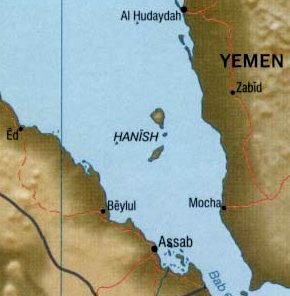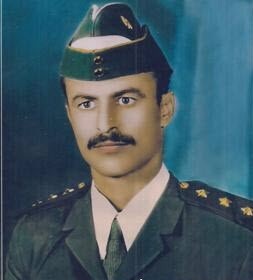|
Hanish Islands
The Hanish Islands ( ar, جزر حنيش, ) is an archipelago in the Red Sea consisting of a trio of major islands at the centre of an array of smaller islets and rocks. The three major islands are the northern Zuqar Island, the southern Great Anish (Al-anīsh al-Kabīr), and the significantly smaller Little Anish (Al-anīsh al-Ṣaghīr) in between. The archipelago is largely under the control of Yemen, with only several small south-western rocks and islets granted to Eritrea following the Hanish Islands conflict in 1996. History The Ottoman Empire exercised claim over the Hanish archipelago until its dissolution following World War I, after which the sovereignty and political status of the islands were left indeterminate by the 1923 Treaty of Lausanne. Italy exercised loose control over the fishermen frequenting the archipelago through its geographical proximity to Italian Eritrea, until the country's occupation by the British in 1915 to "forestall the Italians". The ... [...More Info...] [...Related Items...] OR: [Wikipedia] [Google] [Baidu] |
Geography
Geography (from Greek: , ''geographia''. Combination of Greek words ‘Geo’ (The Earth) and ‘Graphien’ (to describe), literally "earth description") is a field of science devoted to the study of the lands, features, inhabitants, and phenomena of Earth. The first recorded use of the word γεωγραφία was as a title of a book by Greek scholar Eratosthenes (276–194 BC). Geography is an all-encompassing discipline that seeks an understanding of Earth and its human and natural complexities—not merely where objects are, but also how they have changed and come to be. While geography is specific to Earth, many concepts can be applied more broadly to other celestial bodies in the field of planetary science. One such concept, the first law of geography, proposed by Waldo Tobler, is "everything is related to everything else, but near things are more related than distant things." Geography has been called "the world discipline" and "the bridge between the human and ... [...More Info...] [...Related Items...] OR: [Wikipedia] [Google] [Baidu] |
Islands Of Eritrea
An island (or isle) is an isolated piece of habitat that is surrounded by a dramatically different habitat, such as water. Very small islands such as emergent land features on atolls can be called islets, skerries, cays or keys. An island in a river or a lake island may be called an eyot or ait, and a small island off the coast may be called a holm. Sedimentary islands in the Ganges delta are called chars. A grouping of geographically or geologically related islands, such as the Philippines, is referred to as an archipelago. There are two main types of islands in the sea: continental and oceanic. There are also artificial islands, which are man-made. Etymology The word ''island'' derives from Middle English ''iland'', from Old English ''igland'' (from ''ig'' or ''ieg'', similarly meaning 'island' when used independently, and -land carrying its contemporary meaning; cf. Dutch ''eiland'' ("island"), German ''Eiland'' ("small island")). However, the spelling of the word ... [...More Info...] [...Related Items...] OR: [Wikipedia] [Google] [Baidu] |
Saudi Arabian-led Intervention In Yemen , the ruling family of Saudi Arabia
{{disambiguation ...
Saudi may refer to: * Saudi Arabia * Saudis, people from Saudi Arabia * Saudi culture, the culture of Saudi Arabia * House of Saud The House of Saud ( ar, آل سُعُود, ʾĀl Suʿūd ) is the ruling royal family of Saudi Arabia. It is composed of the descendants of Muhammad bin Saud, founder of the Emirate of Diriyah, known as the First Saudi state (1727–1818), and ... [...More Info...] [...Related Items...] OR: [Wikipedia] [Google] [Baidu] |
Abd Rabbuh Mansur Hadi
Abdrabbuh Mansur Hadi ( ar, عبدربه منصور هادي, translit=ʿAbd Rabbih Manṣūr Hādī Yemeni pronunciation: ; born 1 September 1945) is a Yemeni politician and former field marshal of the Yemeni Armed Forces who served as the president of Yemen from 2012 until 2022, when he stepped down and transferred executive authority to the Presidential Leadership Council, with Rashad al-Alimi as its chairman. He was the vice president to Ali Abdullah Saleh from 1994 to 2012. Between 4 June and 23 September 2011, Hadi was the acting president of Yemen while Ali Abdullah Saleh was undergoing medical treatment in Saudi Arabia following an attack on the presidential palace during the 2011 Yemeni uprising. On 23 November, he became Acting President again, after Saleh moved into a non-active role pending the presidential election "in return for immunity from prosecution". Hadi was "expected to form a national unity government and also call for early presidential elections within 9 ... [...More Info...] [...Related Items...] OR: [Wikipedia] [Google] [Baidu] |
Houthi
The Houthi movement (; ar, ٱلْحُوثِيُّون ''al-Ḥūthīyūn'' ), officially called Ansar Allah (' ''Partisans of God'' or ''Supporters of God'') and colloquially simply Houthis, is an Islamist political and armed movement that emerged from Saada in North Yemen in the 1990s. The Houthi movement is a predominately Zaidi Shia force, whose leadership is drawn largely from the Houthi tribe. The Houthis have a complex relationship with Yemen's Sunni Muslims; the movement has discriminated against Sunnis, but also recruited and allied with them. Under the leadership of Hussein Badreddin al-Houthi, the group emerged as an opposition to former Yemeni president Ali Abdullah Saleh. They accused him of corruption and criticized him for being backed by Saudi Arabia and the United States. Hussein accused Saleh of seeking to please the U.S. at the expense of the Yemeni people and Yemen's sovereignty. Resisting Saleh's order for his arrest, Hussein was killed in Sa'dah in 20 ... [...More Info...] [...Related Items...] OR: [Wikipedia] [Google] [Baidu] |
Ali Abdullah Saleh
Ali Abdullah Saleh al-Ahmar (, ''ʿAlī ʿAbdullāh Ṣāliḥ al-Aḥmar;'' 21 March 1947There is a dispute as to Saleh's date of birth, some saying that it was on 21 March 1942. See: However, by Saleh's own confession, he was born in 1947 although there is no source to this claim. – 4 December 2017) was a Yemeni politician who served as the first President of Yemen, from Yemeni unification on 22 May 1990 to his resignation on 25 February 2012, following the Yemeni Revolution. Previously, he had served as President of the Yemen Arab Republic, or North Yemen, from July 1978 to 22 May 1990, after the assassination of President Ahmad al-Ghashmi. Saleh developed deeper ties with Western powers, especially the United States, in the War on Terror. Islamic terrorism may have been used and encouraged by Ali Abdullah Saleh to win Western support and for disruptive politically motivated attacks. In 2011, in the wake of the Arab Spring, which spread across North Africa and the Middle ... [...More Info...] [...Related Items...] OR: [Wikipedia] [Google] [Baidu] |
President Of Yemen
The president of the Republic of Yemen is the head of state of Yemen. Under the Constitution of Yemen, the president is also the Supreme Commander of the Armed Forces and head of the executive branch of the Yemeni government. As of 7 April 2022, the powers of the president are exercised by the Presidential Leadership Council, headed by a Chairman. The first and longest-serving president of unified Yemen was Ali Abdullah Saleh and the second was Abdrabbuh Mansur Hadi, who took office on 27 February 2012. The legality of his claim to presidency is in question, as he was the only candidate in the 2012 election and the end of his mandate was originally set for 27 February 2014. His mandate was extended for another year. However, he remained in power after the expiration of his mandate, and on 22 January 2015, he handed over his resignation. He reaffirmed that he intended on resigning two weeks later. After his resignation, the government was assumed by the Houthi Supreme Revolution ... [...More Info...] [...Related Items...] OR: [Wikipedia] [Google] [Baidu] |
Yemeni Civil War (2015–present)
Yemeni Civil War may refer to several historical events which have taken place in Yemen: *Alwaziri coup, February – March 1948 * Yemeni–Adenese clan violence, 1956–60 *North Yemen Civil War, 1962–70 *Aden Emergency, 1963–67 * North Yemen-South Yemen Border Conflict of 1972 *Yemenite War of 1972 *NDF Rebellion, 1978–82 *Yemenite War of 1979 *South Yemen Civil War, January 13–25, 1986 *Yemeni Civil War (1994) *Al-Qaeda insurgency in Yemen, 1998–2014 * Houthi insurgency in Yemen, 2004–15 *South Yemen insurgency, 2009–15 *Yemeni Crisis (2011–present) *Yemeni Revolution, 2011–12 *Yemeni Civil War (2014–present) {{Infobox military conflict , conflict = Yemeni Civil War , partof = the Yemeni Crisis, Arab Winter, War on terror, and the Iran–Saudi Arabia proxy conflict , image = Yemeni Civil War.svg , width ..., ongoing **Saudi Arabian-led intervention in Yemen, March 26, 2015 – ongoing **Lahij insurgency, March ... [...More Info...] [...Related Items...] OR: [Wikipedia] [Google] [Baidu] |
Permanent Court Of Arbitration
The Permanent Court of Arbitration (PCA) is a non-UN intergovernmental organization located in The Hague, Netherlands. Unlike a judicial court in the traditional sense, the PCA provides services of arbitral tribunal to resolve disputes that arise out of international agreements between member states, international organizations or private parties. The cases span a range of legal issues involving territorial and maritime boundaries, sovereignty, human rights, international investment, and international and regional trade. The PCA is constituted through two separate multilateral conventions with a combined membership of 122 states. The organization is not a United Nations agency, but the PCA is an official United Nations Observer. The PCA was created at the first Hague Peace Conference of 1899. The Peace Palace was built from 1907 to 1913 for the PCA in The Hague. In addition, the building houses The Hague Academy of International Law, Peace Palace Library and the International Cour ... [...More Info...] [...Related Items...] OR: [Wikipedia] [Google] [Baidu] |
Eritrean War Of Independence
The Eritrean War of Independence was a war for independence which Eritrean independence fighters waged against successive Ethiopian governments from 1 September 1961 to 24 May 1991. Eritrea was an Italian colony from the 1880s until the defeat of the Italians by the Allies of World War II in 1941, Eritrea then briefly became a British protectorate until 1951. The General Assembly of the United Nations held a meeting about the fate of Eritrea, in which the majority of the delegates voted for the federation of Eritrea with Ethiopia, and Eritrea became a constituent state of the Federation of Ethiopia and Eritrea in 1952. The Federation was supposed to last for ten years in which Eritreans could have mini sovereign decisions such as a parliament and some autonomy, but under the Ethiopian crown for further ones. The Assembly also assigned commissioner Anzio Mattienzo to supervise the process. Eritreans were supposed to claim Eritrea as an independent sovereign state after the ... [...More Info...] [...Related Items...] OR: [Wikipedia] [Google] [Baidu] |
Ethiopia
Ethiopia, , om, Itiyoophiyaa, so, Itoobiya, ti, ኢትዮጵያ, Ítiyop'iya, aa, Itiyoppiya officially the Federal Democratic Republic of Ethiopia, is a landlocked country in the Horn of Africa. It shares borders with Eritrea to the north, Djibouti to the northeast, Somalia to the east and northeast, Kenya to the south, South Sudan to the west, and Sudan to the northwest. Ethiopia has a total area of . As of 2022, it is home to around 113.5 million inhabitants, making it the 13th-most populous country in the world and the 2nd-most populous in Africa after Nigeria. The national capital and largest city, Addis Ababa, lies several kilometres west of the East African Rift that splits the country into the African and Somali tectonic plates. Anatomically modern humans emerged from modern-day Ethiopia and set out to the Near East and elsewhere in the Middle Paleolithic period. Southwestern Ethiopia has been proposed as a possible homeland of the Afroasiatic langua ... [...More Info...] [...Related Items...] OR: [Wikipedia] [Google] [Baidu] |





